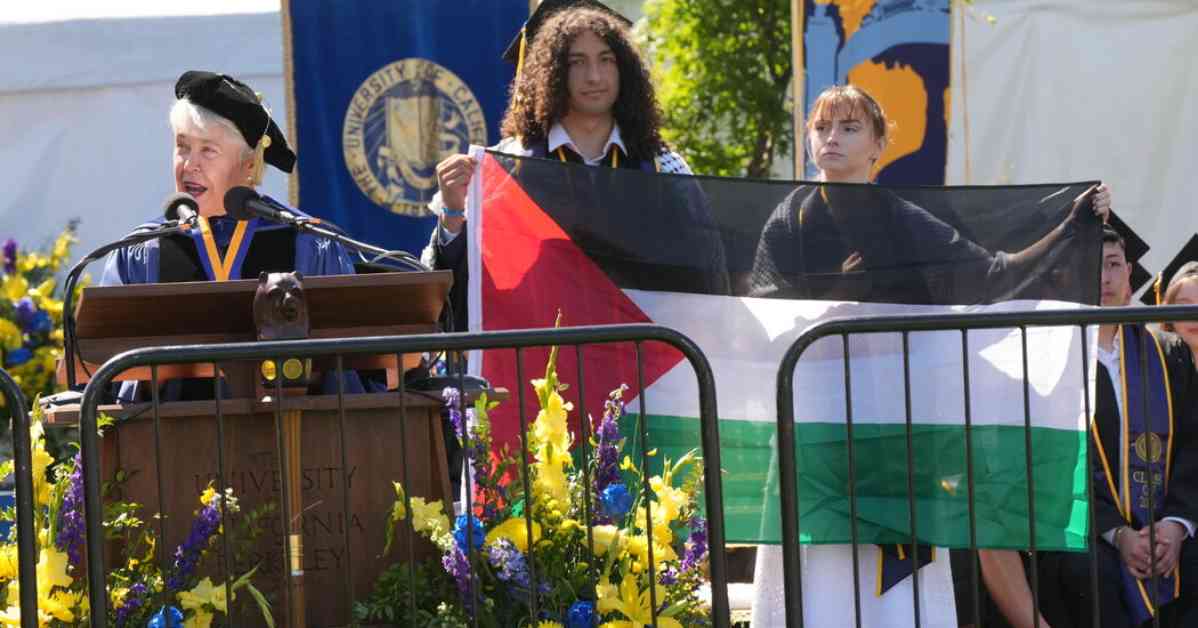Carol Christ, the outgoing chancellor of the University of California, Berkeley, recently made headlines for her remarks on the importance of toning down speech, even as she has championed free speech throughout her tenure. As she prepares to retire at the end of this month, Christ’s words serve as a reminder to today’s students about the responsibility that comes with exercising their right to free expression.
The incident that sparked Christ’s comments occurred during the university’s commencement ceremony last month, where pro-Palestinian demonstrators disrupted the event by unfurling a Palestinian flag and chanting anti-Israel slogans. The disruption caused a commotion, with waves of boos and angry chants filling the air, threatening to derail the ceremony altogether.
Despite the chaos, Christ remained steadfast in her commitment to upholding free speech and allowing for dissenting voices to be heard. As a former student protester herself during the 1960s, Christ understands the value of protest and the importance of allowing for differing viewpoints to be expressed, even when they may be controversial or disruptive.
In a sit-down interview after the ceremony, Christ reflected on the events that transpired and defended her decision to allow the protest to continue. She emphasized that Berkeley has a long history of activism and protest, and that allowing for dissenting voices to be heard is a fundamental part of the university’s ethos.
As she prepares to step down from her role as chancellor, Christ leaves behind a legacy of advocating for free speech and open dialogue on campus. Her tenure has been marked by a commitment to fostering a diverse and inclusive community where all voices are welcome, even those that may challenge the status quo.
The Importance of Free Speech on College Campuses
The issue of free speech on college campuses has become a hot-button topic in recent years, with debates raging over the limits of expression and the boundaries of acceptable discourse. As institutions of higher learning, universities play a crucial role in shaping the minds of the next generation, and the principles of free speech and open dialogue are essential to the pursuit of knowledge and understanding.
While it is important to protect the right to free speech, it is equally important for students to exercise that right responsibly. As Christ pointed out, just because you have the right to say something doesn’t mean it’s right to say it. In a diverse and multicultural society, it is crucial to consider the impact of our words and actions on others, especially those who may be marginalized or vulnerable.
Navigating Controversial Topics with Respect and Sensitivity
The incident at Berkeley’s commencement ceremony serves as a reminder of the challenges of navigating controversial topics on college campuses. As students, faculty, and administrators grapple with issues of race, religion, politics, and identity, it is important to approach these discussions with respect and sensitivity.
While it is natural for people to have strong opinions and beliefs, it is essential to engage in dialogue with an open mind and a willingness to listen to opposing viewpoints. By fostering a culture of respectful debate and discussion, colleges and universities can create a more inclusive and welcoming environment for all members of the community.
Looking Towards the Future
As Carol Christ prepares to pass the torch to her successor, she leaves behind a legacy of advocating for free speech and open dialogue on college campuses. Her words of wisdom serve as a reminder to today’s students about the power of words and the responsibility that comes with exercising the right to free expression.
In an era of increasing polarization and divisiveness, it is more important than ever for individuals to engage in dialogue with empathy and understanding. By listening to one another with an open heart and mind, we can build bridges of understanding and create a more inclusive and equitable society for all.




















